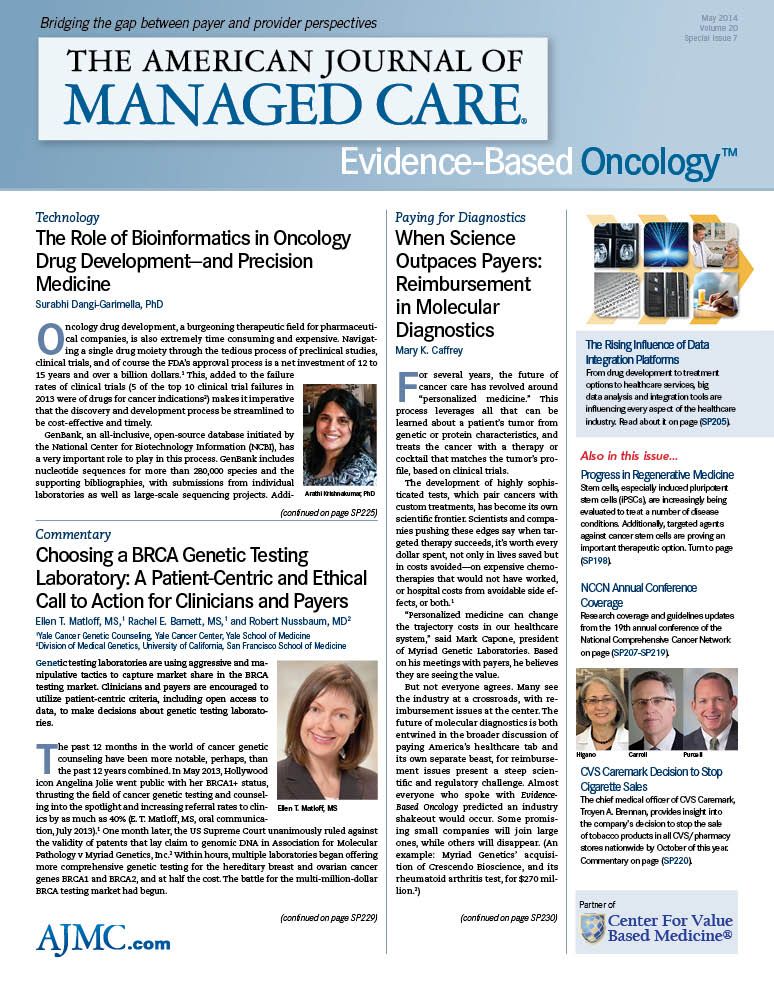- Center on Health Equity & Access
- Clinical
- Health Care Cost
- Health Care Delivery
- Insurance
- Policy
- Technology
- Value-Based Care
Roche Molecular Diagnostic's cobas HPV Test Approved by the FDA
A test that can detect the DNA of the human papilloma virus (HPV), to confirm the need for cervical cancer screening in women 25 years and older, has gained the FDA’s support as a primary screening test. This test, developed by Roche Molecular Diagnostics, can also provide information on the patient’s risk of developing cervical cancer in the future.1
According to the company website, the HPV test, which utilizes a sample of cervical cells, can simultaneously detect 14 high-risk HPV subtypes and can provide specific genotyping information for HPV types 16 and 18 in a single analysis by polymerase chain reaction (PCR).2
Women who test positive for HPV 16 or HPV 18, based on the results of the test, are further advised to undergo colposcopy, while women who test positive for 1 or more of the other 12 high-risk
HPV types are recommended to undergo a Papanicolaou (Pap) test to confirm a need for colposcopy. Additionally, the FDA recommends that providers view the results of the cobas HPV test in conjunction with patient screening history, risk factors, and professional guidelines on cervical cancer detection.1
Initially approved in 2011 as a followup to a Pap test, the current approval allows using cobas as a co-test or a primary cervical cancer screening test, without altering the current practice
guidelines. Data provided by the company for the current approval included a study of more than 40,000 women 25 years and older undergoing routine cervical exams. Women who had a
positive Pap test or whose cervical cells screened positive for HPV, as well as a subset of women whose Pap and HPV tests were both negative, underwent a colposcopy and cervical tissue biopsy.
Biopsy results were compared with the Pap and cobas HPV test results. Following a 3-year follow-up on women who underwent colposcopy, the cobas HPV test was deemed safe and effective for its new indication for use.1
According to the CDC, deaths due to cervical cancer have significantly decreased as a result of regular Pap tests, which can detect precancerous cervical cells. Despite the progress, the latest
statistic shows that 11,818 women in the United States were diagnosed with cervical cancer in 2010 and 3939 women died of the disease that year.3 References
1. FDA approves first human papillomavirus test for primary cervical cancer screening [press release]. Silver Spring, MD: FDA; April 24, 2014. http://www.fda.gov/newsevents/newsroom/
pressannouncements/ucm394773.htm. Accessed April 30, 2014.
2. cobas HPV test. Roche Molecular Diagnostics website. http://molecular.roche.com/assays/Pages/cobasHPVTest.aspx. Accessed May 1, 2014.
3. Cervical cancer statistics. CDC website. http://www.cdc.gov/cancer/cervical/statistics/.Accessed April 30, 2014.

Empowering Children and Parents Through Technology: Opportunities, Challenges, and Future Directions
January 15th 2026Digital health platforms improve pediatric care by offering customized, interactive tools for children and parents. They enhance education, support, and engagement while tackling challenges related to access, usability, and privacy.
Read More
Insights Into Patient Portal Engagement Leveraging Observational Electronic Health Data
January 12th 2026This analysis of more than 250,000 adults at least 50 years old with chronic conditions showed lower portal use among older, non–English-speaking, and Black patients, underscoring digital health equity gaps.
Read More
Subjective and Objective Impacts of Ambulatory AI Scribes
January 8th 2026Although the vast majority of physicians using an artificial intelligence (AI) scribe perceived a reduction in documentation time, those with the most actual time savings had higher relative baseline levels of documentation time.
Read More
Telehealth Intervention by Pharmacists Collaboratively Enhances Hypertension Management and Outcomes
January 7th 2026Patient interaction and enhanced support with clinical pharmacists significantly improved pass rates for a measure of controlling blood pressure compared with usual care.
Read More

